
August 1
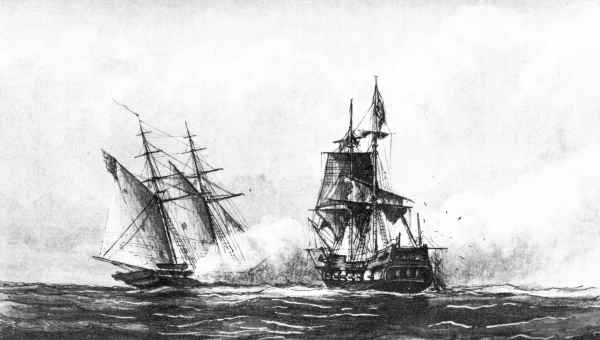
1801 First Barbary War: America's first confrontation with state-sponsored terrorism (piracy) begins as an American schooner, the USS Enterprise, defeats the 14-gun corsair Tripoli in the Mediterranean Sea. (Lambert) [For further details, Click here.]

1892 Alois Hitler is again promoted, to Higher Customs Officer of Passau, on the German side of the border. All the work of the Customs House was done on the German side of the border, in Passau itself, by joint agreement with Austria. Alois' income is listed as 2,600 kronen a year. The Hitler family moves out of the Gasthof zum Pommer and into 23 Theresien Strasse, Passau. Thus, at the age of three, Adolf Hitler will live for a time, (until April of 1895), in the country he will one day master. It is supposedly here, in Passau, that Hitler will acquire his distinctive Lower Bavarian accent. [For further details, Click here.]
Adolf Hitler, from Mein Kampf: "The German of my youth was the dialect of Lower Bavaria; I could neither forget it nor learn the Viennese jargon." Hitler's "youth" was only up to the age of 6, when his family returned to Austria proper. He should have been able to absorb more than one dialect. It is much more likely that his Bavarian dialect stemmed from 1913 onwards, when he went over to Munich, served in a Bavarian regiment throughout WWI and afterwards, and made Munich his base until 1933. It has also been pointed out that he is making a subjective distinction between a German dialect and the "jargon" of the great Viennese capital. Whether there is much distinction between two south-German dialects is debatable. If it is true that he could not learn Viennese dialect, it was because he was not good at languages. But he seems to have been able to communicate there. [Ed.]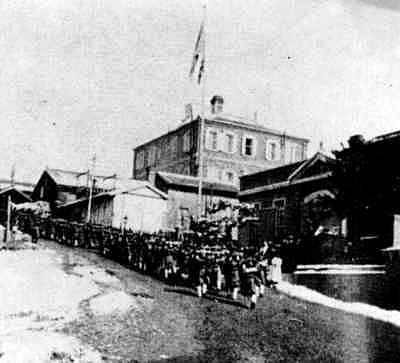
1894 First Sino-Japanese War: War is officially declared between China and Japan over Korea. (Sedwick)

1907 Korea: Japan consolidates its control of Korea by installing Japanese citizens in all government ministries and disbanding the entire Korean military.
1914 World War I: Various:

The Kaiser (left) and the Tsar (right)
Imperial Communications: From telegrams sent, in the original English, between the German Emperor, Wilhelm II, and his cousin the Russian Tsar, Nicholas II, in the immediate run-up to the outbreak of war. The original source for the telegrams is The Kaiser's Letters to the Tsar, copied from the government archives in Petrograd, and brought from Russia, edited by Isaac Don Levine, published by Hodder and Stoughton (London, 1920):
Nicky to Willy I received your telegram. Understand you are obliged to mobilise but wish to have the same guarantee from you as I gave you, that these measures do not mean war and that we shall continue negotiating for the benefit of our countries and universal peace deal to all our hearts. Our long proved friendship must succeed, with God's help, in avoiding bloodshed. Anxiously, full of confidence await your answer. Nicky.
Willy to Nicky Thanks for your telegram. I yesterday pointed out to your government the way by which alone war may be avoided. Although I requested an answer for noon today, no telegram from my ambassador conveying an answer from your Government has reached me as yet. I therefore have been obliged to mobilise my army. Immediate affirmative clear and unmistakable answer from your government is the only way to avoid endless misery. Until I have received this answer alas, I am unable to discuss the subject of your telegram. As a matter of fact I must request you to immediatly [sic] order your troops on no account to commit the slightest act of trespassing over our frontiers. Willy.
First World War erupts
Four days after Austria-Hungary declared war on Serbia, Germany and Russia declare war against each other, France orders a general mobilization, and the first German army units cross into Luxembourg in preparation for the German invasion of France. During the next three days, Russia, France, Belgium, and Great Britain all lined up against Austria-Hungary and Germany, and the German army invaded Belgium. The "Great War" that ensued was one of unprecedented destruction and loss of life, resulting in the deaths of some 20 million soldiers and civilians.
On June 28, 1914, in an event that is widely regarded as sparking the outbreak of World War I, Archduke Franz Ferdinand, heir to the Austro-Hungarian empire, was shot to death with his wife by Bosnian Serb Gavrilo Princip in Sarajevo, Bosnia. Ferdinand had been inspecting his uncle's imperial armed forces in Bosnia and Herzegovina, despite the threat of Serbian nationalists who wanted these Austro-Hungarian possessions to join newly independent Serbia. Austria-Hungary blamed the Serbian government for the attack and hoped to use the incident as justification for settling the problem of Slavic nationalism once and for all. However, as Russia supported Serbia, an Austria-Hungary declaration of war was delayed until its leaders received assurances from German leader Kaiser Wilhelm II that Germany would support their cause in the event of a Russian intervention.
On July 28, Austria-Hungary declared war on Serbia, and the tenuous peace between Europe's great powers collapsed. On July 29, Austro-Hungarian forces began to shell the Serbian capital of Belgrade, and Russia, Serbia's ally, ordered a troop mobilization against Austria-Hungary. France, allied with Russia, began to mobilize on August 1. France and Germany declared war against each other on August 3. After crossing through neutral Luxembourg, the German army invaded Belgium on the night of August 3-4, prompting Great Britain, Belgium's ally, to declare war against Germany.
For the most part, the people of Europe greeted the outbreak of war with jubilation. Most patriotically assumed that their country would be victorious within months. Of the initial belligerents, Germany was most prepared for the outbreak of hostilities, and its military leaders had formatted a sophisticated military strategy known as the "Schlieffen Plan," which envisioned the conquest of France through a great arcing offensive through Belgium and into northern France. Russia, slow to mobilize, was to be kept occupied by Austro-Hungarian forces while Germany attacked France.
The Schlieffen Plan was nearly successful, but in early September the French rallied and halted the German advance at the bloody Battle of the Marne near Paris. By the end of 1914, well over a million soldiers of various nationalities had been killed on the battlefields of Europe, and neither for the Allies nor the Central Powers was a final victory in sight. On the western front—the battle line that stretched across northern France and Belgium—the combatants settled down in the trenches for a terrible war of attrition.
In 1915, the Allies attempted to break the stalemate with an amphibious invasion of Turkey, which had joined the Central Powers in October 1914, but after heavy bloodshed the Allies were forced to retreat in early 1916. The year 1916 saw great offensives by Germany and Britain along the western front, but neither side accomplished a decisive victory. In the east, Germany was more successful, and the disorganized Russian army suffered terrible losses, spurring the outbreak of the Russian Revolution in 1917. By the end of 1917, the Bolsheviks had seized power in Russia and immediately set about negotiating peace with Germany. In 1918, the infusion of American troops and resources into the western front finally tipped the scale in the Allies' favor. Bereft of manpower and supplies and faced with an imminent invasion, Germany signed an armistice agreement with the Allies in November 1918.
World War I was known as the "war to end all wars" because of the great slaughter and destruction it caused. Unfortunately, the peace treaty that officially ended the conflict—the Treaty of Versailles of 1919—forced punitive terms on Germany that destabilized Europe and laid the groundwork for World War II.(History.com)

1915 World War I: List Regiment: Gefreiter Adolf Hitler's 16 Reserve Infantry Regiment continue to occupy a position at Fromelles—pictured above in a drawing by Hitler—on a level field with water channels, willow trees and willow stalks; in the distance towards the enemy lines lies an insignificant wood with barbed wire entanglements. Under the direction of their defense-minded commander, Lieutenant General Gustav Scanzoni von Lichtenfels, the regiment works ceaselessly day and night to further fortify their position at Fromelles while fighting off repeated assaults by the enemy. [For further details, Click here.]
1916 World War I: List Regiment: Gefreiter Adolf Hitler endures trench warfare in Flanders (Artois) with 3 Company, 16 Reserve Infantry Regiment. [For further details, Click here.]
1917 World War I: Pope Benedict XV's Peace Note:
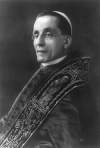
From the beginning of Our Pontificate, amidst the horrors of the terrible war unleashed upon Europe, We have kept before Our attention three things above all: to preserve complete impartiality in relation to all the belligerents, as is appropriate to him who is the common father and who loves all his children with equal affection; to endeavour constantly to do all the most possible good, without personal exceptions and without national or religious distinctions, a duty which the universal law of charity, as well as the supreme spiritual charge entrusted to Us by Christ, dictates to Us; finally, as Our peacemaking mission equally demands, to leave nothing undone within Our power, which could assist in hastening the end of this calamity, by trying to lead the peoples and their heads to more moderate frames of mind and to the calm deliberations of peace, of a "just and lasting" peace. [For further details, Click here]
1917 World War I: List Regiment (July 22-August 3): Dispatch Runner Gefreiter Adolf Hitler serves at the front with 3 Company, 16 Bavarian Reserve Infantry Regiment during Phase 2 operations in Flanders. Most of their time in the trenches gas masks are worn, while English bombers and tanks—a new terror witnessed for the very first time by most—attempt to advance over a long front through seas of mud. [For further details, Click here.]
1918 World War I: Various:
Allied warships approach the mouth of the North Dvina River and attack Soviet coastal defense batteries as Allied aircraft fly over Archangel. (THP)
List Regiment: (July 20-August 4):Gefreiter Adolf Hitler's 16th RIR is tasked with building a new line of defenses on the site of the failed Second Battle of the Marne. [For further details, Click here.]
Bolshevik Revolution: Appeal from the Council of People's Commissars to the Toiling Masses of England, America, France, Italy, and Japan on Allied Intervention in Russia:
Workers! Like a vicious dog let off the leash, the entire capitalist press of your countries is howling for the 'intervention' of your Governments in Russian affairs, shrieking, 'now or never!' But even at this moment, when these hirelings of your exploiters have dropped their masks and are clamouring for an attack on the workers and peasants of Russia, even at this moment they lie unscrupulously, and shamelessly deceive you.
1923 Weimar: Hitler speaks in Munich:
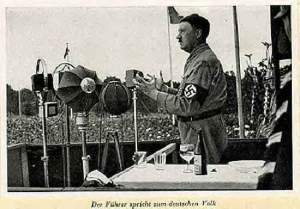
There are two things which can unite men: common ideals and common criminality. We have inscribed upon our banner the great Germanic ideal and for that ideal we will fight to the last drop of our blood. We National Socialists have realized that from the international cesspool of infamy, from the Berlin of today, nothing can come to save the Fatherland. We know that two things alone will save us: first, the end of internal corruption, the cleansing out of all those who owe their existence simply to the protection of their party comrades. Through the most brutal ruthlessness towards all party officials we must restore our finances. It must be proved that the official is not a party man, but a specialist! The body of German officials must once more become what once it was. But the second and the most important point is that the day must come when a German government shall summon up the courage to declare to the Foreign Powers: 'The Treaty of Versailles is founded on a monstrous lie. We refuse to carry out its terms any longer. Do what you will! If you wish for war, go and get it! Then we shall see whether you can turn seventy million Germans into serfs and slaves!' [For further details, Click here]
1927 China: The Nanchang Uprising was the first major Kuomintang-Communist engagement of the Chinese Civil War, in order to counter the anti-communist purges by the Nationalist Party of China.
The Kuomintang (KMT, or Nationalist Party) established a 'Revolutionary Committee' at Nanchang to plan the spark that was expected to ignite a widespread peasant uprising. Deng Yanda, Song Qingling (Soong Ching-ling, Madame Sun Yat-sen) and Zhang Fakui (who later crushed the uprising) were among the political leaders.[1]
Military forces in Nanchang rebelled under the leadership of He Long and Zhou Enlai attempting to seize control of the city after the end of the first Kuomintang-Communist alliance. Other important leaders in this event were Zhu De, Ye Ting, and Liu Bocheng.
Communist forces successfully occupied Nanchang and escaped from the siege of Kuomintang forces by August 5, withdrawing to the Jinggang Mountains of western Jiangxi. The day of August 1 was later regarded as the anniversary of the founding of the People's Liberation Army. It is regarded as the first action fought against the Kuomintang. [For further details, Click here]
1929 Weimar: Aug 1-4 Hitler attends the Fourth Party Rally in Nuremberg: (Maser)
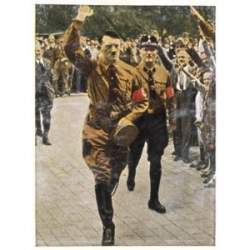
The primary aspect of the Nuremberg Rallies was the almost religious focus on Adolf Hitler, portraying Hitler as Germany's savior, chosen by providence. The gathered masses listened to the Fuehrer's speeches, swore loyalty and marched before him. Representing the Volksgemeinschaft as a whole, the rallies served to demonstrate the might of the German people. [For further details, Click here]
1931 Pastor Dietrich Bonhoeffer:

Bonhoeffer served as a curate for a German congregation in Barcelona during 1929-1930. Following his ordination at St. Matthias Church, Berlin, in November 1931, he was to help organize the Pastors' Emergency League in September 1933, prior to asssuming the pastorate of the German Evangelical Church, Sydenham, and the Reformed Church of St. Paul in London. During his sojourn in England, Bonhoeffer became a close friend and confidant of the influential Anglican Bishop, George Bell. [For further details, Click here]
1933 Holocaust: Germany: A Nazi decree prohibits non-Jewish doctors from professional contact with Jewish physicians. (THP)
1934 Antisemitism: Lithuanian government suppresses all Jewish newspapers.
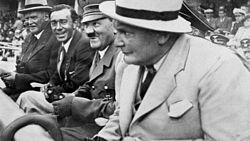
1936 The Nazi Olympics: The 1936 Olympic Games begin in Berlin. For propaganda reasons, most anti-Jewish measures are avoided for the duration of the games, and slogans are removed from the streets. [For further details, Click here]

The Messerschmitt ME-109—a highly successful single-seat fighter—is first publicly displayed at the 1936 Olympic games in Berlin. It is subsequently tested and proven during the Spanish Civil War.
The Messerschmitt Bf 109 fighter was flown by many of the top scoring Luftwaffe fighter pilots during WW II. The top fighter pilot of all time, Erich Hartmann (who flew 1,400 missions, shot down 352 enemy planes—mostly on the Eastern Front—and was proudest of the fact that he never lost a wingman), and the second highest scoring fighter pilot of all time.
1938 Hawaii: The Hilo Massacre occurs as over 70 police officers attempt to disband 200 unarmed protesters during a multi-ethnic strike (Chinese, Japanese, Native Hawaiian, Luso and Filipino Americans), injuring 50 of the demonstrators, but causing no deaths. (Niiya)
[See: Countdown to Infamy: Timeline to Pearl Harbor.]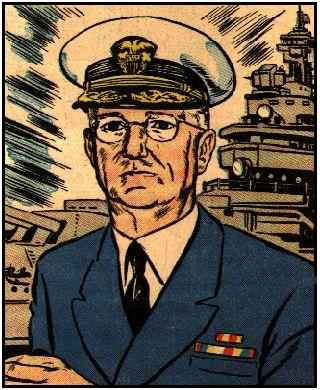
1939 USA: Various:
Countdown to War: Harold Raynsford Stark becomes the Chief of Naval Operations, with the rank of Admiral. In this position, he will direct the expansion of the Navy during 1940 and 1941, and its involvement in an undeclared war against German submarines in the Atlantic during the latter part of 1941. During his watch, the growing menace of Japanese forces will culminate in the attack on Pearl Harbor. He will be accused of not providing sufficient information to Admiral Kimmel, Commander of the Pacific Fleet at Pearl Harbor, about Japanese moves in the fall of 1941 to enable to Kimmel to anticipate an attack.
The US Congress passes a bill outlawing the use of uniforms and firearms by any organization conflicting with the American government. (THP)
1940 World War II: Various: Hitler issues Directive #17 for the invasion of Britain:
The Luftwaffe will use all the forces at its disposal to destroy the British air force as quickly as possible. August 5th is the first day on which this intensified air war may begin, but the exact date is to be left to the Luftwaffe and will depend on how soon its preparations are complete, and on the weather situation. [For further details, Click here]
[See: Why Did Hitler Lose The Battle of Britain?]The Duke and Duchess of Windsor depart Lisbon for the Bahamas aboard the steamship Excalibur. The Duke becomes Governor of the Bahamas:
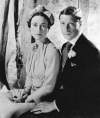
[The] Federal Bureau of Investigation received information that the Duke and Duchess of Windsor were being used by the Nazis to obtain secrets about the Allies. On 13th September 1940, an FBI officer sent a memo to J. Edgar Hoover that an agent had established conclusively that the Duchess of Windsor has recently been in touch with Joachim von Ribbentrop and was maintaining constant contact and communication with him. Because of their high official position, the duchess was obtaining a variety of information concerning the British and French official activities that she was passing on to the Germans. The British government also discovered that Adolf Hitler planned to make Edward the puppet king of the United Kingdom if the Germans won the Second World War. When he heard the news, Winston Churchill, the British prime minister, arranged for the Duke of Windsor to leave Europe and become the governor of the Bahamas. [For further details, Click here]
1941 World War II: Various:

The Jeep: Parade magazine calls it [the] Army's most intriguing new gadget . . . . a tiny truck which can do practically everything". The US Army had been looking for a fast, lightweight all-terrain vehicle, but the search did not grow urgent until early 1940. At this time, the Axis powers had begun to score victories in Europe and Northern Africa, intensifying the Allies' need for an all-terrain vehicle. The US Army issued a challenge to automotive companies, requesting a working prototype, fit to army specifications, in just forty-nine days. Willy's Truck Company was the first to successfully answer the Army's call, and the new little truck was christened "the Jeep." General Dwight D. Eisenhower said that America could not have won World War II without it. Parade is so enthusiastic about the Jeep, that, on this day, it devotes three full pages to a feature on the vehicle.
The Grumman TBF Avenger torpedo plane makes its first flight:

The Grumman TBF Avenger was a torpedo bomber developed initially for the United States Navy and Marine Corps, and eventually used by several air or naval arms around the world. It entered U.S. service in 1942, and first saw action during the Battle of Midway.
Barbarossa: Armeegruppe Mitte continues its liquidation of the Smolensk pocket. Soviet troops put up fierce resistance near Orsha and Vitebsk west of Smolensk. A powerful counter-offensive is launched at Gomel south of Mogilev against German bridgeheads over the Dnieper River.
Britain severs relations with Finland: The Germans are using the country as a base for their invasion.
Holocaust:
In the five weeks since [the start of] the German invasion [of the USSR], the number of Jews killed exceeds the total number killed in the previous eight years of Nazi rule [in the greater German Reich and occupied territories]. (THP)
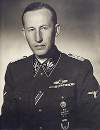
Reinhardt Heydrich informs Heinrich Himmler that "It may be safely assumed that in the future there will be no more Jews in the annexed eastern territories." (THP)
1942 World War II: Various:
USA: Ensign Henry C. White, while flying a J4F Widgeon plane, sinks U-166 as it approaches the Mississippi River, the first U-boat sunk by the US Coast Guard.
For the next two weeks, Kuhlmann patrolled off the Cuban coast and gradually moved northward into the northern Gulf of Mexico. By the end of the month, U-166 was off the mouth of the Mississippi River, in an excellent position both to intercept traffic coming in and out of New Orleans and also to encounter tankers steaming eastward from the Texas Gulf ports. Oberleutnant Kuhlmann was probably getting anxious for a suitable target.
Barbarossa: Armeegruppe A in the south continues to fan out into the Caucasus region, while advance units reach the Kuban River. Armeegruppe B continues to fight to cut off the Soviet defenders near Kalach in the Don bend near Stalingrad.
1943 World War II: Various:
War in the Air: Romania: More than 175 American B-24 Liberators) bomb the Ploesti oilfields in Romania, a 2,400-mile round trip from Libya. This low-level attack severely damages the major oil center of Hitler's Europe, but the US Ninth Air Force loses 54 planes during the raid.
Oak Ridge: A groundbreaking ceremony takes place in Oak Ridge, Tennessee for the first uranium 235 plant. (Uranium 235 was needed to build the A-bomb.) The uranium manufacturing facility cost $280,000,000 to build and is completed in the summer of 1944.
The mission of Oak Ridge was to produce enriched uranium for the first atomic bombs. The site was selected because the Clinch River provided ample supplies of water, nearby Knoxville was a good source of labor, and the TVA could supply the huge amounts of electricity needed.
Sicily: Increasingly heavy fighting continues, with some of the most fierce fighting for the Island thus far taking place.
German withdrawal from the Orel area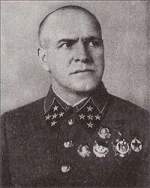
Zhukov
After the Battle of Kursk in July 1943, the Germans took up defensive positions and fell back in an orderly retreat. The Red Army, now with aggressive, confident commanders like Georgi Zhukov and Vasily Chuikov backed by increasing quantities of tanks, aircraft, planes and men, supplemented by deliveries from the United States and the United Kingdom, created a very large force that the Soviets were able to convert from defense at Kursk to offense almost immediately. [For further details, Click here]
War at Sea: PT-109 sinks; Lieutenant Kennedy instrumental in saving crew:
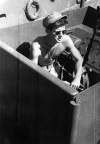
On this day in 1943, a Japanese destroyer rams an American PT (patrol torpedo) boat, No. 109, slicing it in two. The destruction is so massive other American PT boats in the area assume the crew is dead. Two crewmen were, in fact, killed, but 11 survived, including Lt. John F. Kennedy.
Japanese aircraft had been on a PT boat hunt in the Solomon Islands, bombing the PT base at Rendova Island. It was essential to the Japanese that several of their destroyers make it to the southern tip of Kolombangara Island to get war supplies to forces there. But the torpedo capacity of the American PTs was a potential threat. Despite the base bombing at Rendova, PTs set out to intercept those Japanese destroyers. In the midst of battle, Japan's Amaqiri hit PT-109, leaving 11 crewmen floundering in the Pacific.
After five hours of clinging to debris from the decimated PT boat, the crew made it to a coral island. Kennedy decided to swim out to sea again, hoping to flag down a passing American boat. None came. Kennedy began to swim back to shore, but strong currents, and his chronic back condition, made his return difficult. Upon reaching the island again, he fell ill. After he recovered, the PT-109 crew swam to a larger island, what they believed was Nauru Island, but was in fact Cross Island. They met up with two natives from the island, who agreed to take a message south. Kennedy carved the distress message into a coconut shell: "Nauru Is. Native knows posit. He can pilot. 11 alive need small boat."
The message reached Lieutenant Arthur Evans, who was watching the coast of Gomu Island, located next to an island occupied by the Japanese. Kennedy and his crew were paddled to Gomu. A PT boat then took them back to Rendova. Kennedy was ultimately awarded the Navy and Marine Corps Medal, for gallantry in action.
The coconut shell used to deliver his message found a place in history, and in the Oval Office. (History.com)
1944 World War II: Various:
Finland: President Risto Ryti resigns. His place is taken by Marshal Karl Gustav Mannerheim.
Warsaw Revolt begins (Not to be confused with the Ghetto Uprising):
During World War II, an advance Soviet armored column under General Konstantin Rokossovski reaches the Vistula River along the eastern suburb of Warsaw, prompting Poles in the city to launch a major uprising against the Nazi occupation. The revolt was spearheaded by Polish General Tadeusz Bor-Komorowski, who was the commander of the Home Army, an underground resistance group made up of some 40,000 poorly supplied soldiers. In addition to accelerating the liberation of Warsaw, the Home Army, which had ties with the Polish government-in-exile in London and was anti-communist in its ideology, hoped to gain at least partial control of Warsaw before the Soviets arrived.
Although the Poles in Warsaw won early gains—and Soviet liberation of the city was inevitable—Nazi leader Adolf Hitler ordered his authorities to crush the uprising at all costs. The elite Nazi SS directed the German defense force, which included the Kaminiski Brigade of Russian prisoners and the Dirlewanger Brigade of German convicts. In brutal street fighting, the Poles were gradually overcome by the superior German weaponry. As the rebels were suppressed, the Nazis deliberately razed large portions of the city and massacred many civilians.
Meanwhile, the Red Army gained several bridgeheads across the Vistula River but made no efforts to aid the rebels in Warsaw. The Soviets also rejected a request by the British to use Soviet air bases to airlift supplies to the beleaguered Poles. The rebels and the city's citizens ran out of medical supplies, food, and eventually water. Finally, on October 2, the surviving rebels, including Bor-Komorowski, surrendered.
During the 63-day ordeal, three-fourths of the Home Army perished along with 200,000 civilians. As a testament to the ferocity of the fighting, the Germans also suffered high casualties: 10,000 killed, 9,000 wounded, and 7,000 missing. During the next few months, German troops deported the surviving population, and demolition squads destroyed what buildings remained intact in Warsaw. All of its great treasures were looted or burned. The Red Army remained dormant outside Warsaw until January 1945, when the final Soviet offensive against Germany commenced. Warsaw, a city in ruins, was liberated on January 17. With Warsaw out of the way, the Soviets faced little organized opposition in establishing a communist government in Poland. (History.com)
Holocaust:

Thirteen-year-old Anne Frank makes the last entry in her diary; a diary she had kept for two years while hiding with her family to escape Nazi deportation to a concentration camp. Three days later the Gruene Polizei raid the secret annex in Amsterdam, Holland, where the Jewish family is in hiding. Anne will die in Bergen-Belsen concentration camp at the age of 15.
1946 Nuremberg Tribunal: One Hundred Ninety-Second Day of the trial: The question of the criminal organizations is considered.
1954 Spandau Prison: From Spandau: The Secret Diaries, by Albert Speer:
The food program for the Russian month has scarcly changed in the last seven years. . . . This month the meat smells and tastes abominable. Schirach commented in disgust, "When I find a cat's whisker in the goulash, the truth will be out." Some of the others suspected that it was horsemeat or dog. (Speer II)
1955 Spandau Prison: From Spandau: The Secret Diaries, by Albert Speer:
First day of the American month. In the garden Funk suddenly became conspiratorial and said to Schirach, "Now you watch the soldier on the left tower. When he goes to the other side, give me a sign." And turning to me: "You post yourself a little more to the right. There, now the soldier on the other tower can't see me. And where is the guard? Ah, he's busy with the admiralty back there." Then, in a low voice, he called out, "Schirach! What is your man in the tower doing?" Schirach gave the agreed sign. Funk took a deep breath. Then he reached into his pocket, saying, "Well then, cheers!" With a groan of pleasure Funk took a long drink, then passed the bottle on. It was quickly emptied. "First rate," Funk moaned. "From my wife. Eighty proof—real aged rum. Now we know what were missing. We manage to get used to doing without other things, but not this!" He looked around. "But what are we going to do with the bottle?" We dug a deep hole and buried the bottle in it. The label read, "Tussamag Cough Syrup." (Speer II)
1970 Death: Otto Heinrich Warburg: German physiologist and medical doctor:
He was director (1931-1953) of the Kaiser Wilhelm Institute (now Max Planck Institute) for cell physiology at Berlin. He investigated the metabolism of tumors and the respiration of cells, particularly cancer cells. For his discovery of the nature and the mode of action of (Warburg's) yellow enzyme, he won the 1931 Nobel Prize in Physiology or Medicine. He edited and has much of his original work published in The Metabolism of Tumours (tr. 1931) and wrote New Methods of Cell Physiology (1962). Warburg reported the fundamental difference between normal and cancerous cells to be the ratio of glycolysis to respiration. This is contrary to the commonly held "uncontrolled growth". He also wrote The Prime Cause and Prevention of Cancer which he presented in lecture at the meeting of the Nobel-Laureates on June 30, 1966 at Lindau, Lake Constance, Germany. In this speech, Warburg presented evidence proving anaerobiosis to be a primary cause of cancerous cells. Warburg was elected president of Zionist Organization on the 10th World Zionist Congress in Basel and remained in that position from 1911 to 1921.
1975 Cold War: Helsinki Final Act signed:
The United States, the Soviet Union, Canada and every European nation (except Albania) sign the Helsinki Final Act on the last day of the Conference on Security and Cooperation in Europe (CSCE). The act was intended to revive the sagging spirit of detente between the Soviet Union and the United States and its allies. [For further details, Click here.]
1990 Death: Norbert Elias: German sociologist of Jewish descent, who later became a British citizen. In 1930 Elias chose to cancel this project and followed Karl Mannheim to become his assistant at the University of Frankfurt. However, after the Nazi take-over in early 1933, Mannheim's sociological institute was forced to close. His elderly parents remained in Breslau, where his father died in 1940; his mother was deported to Auschwitz, where she probably was killed in 1941. In 1940, when an invasion of Britain by German forces appeared imminent, Elias was detained at internment camps in Liverpool and on the Isle of Man for eight months, on account of his being German (even as Jew).
1994 German President Roman Herzog apologizes for the suffering his nation caused Poland in World War II.
Edited by Levi Bookin (Copy editor)
levi.bookin@gmail.com



Click to join 3rdReichStudies



Disclaimer: This site includes diverse and controversial materials—such as excerpts from the writings of racists and anti-Semites—so that its readers can learn the nature and extent of hate and anti-Semitic discourse. It is our sincere belief that only the informed citizen can prevail over the ignorance of Racialist "thought." Far from approving these writings, this site condemns racism in all of its forms and manifestations.
Fair Use Notice: This site may contain copyrighted material the use of which has not always been specifically authorized by the copyright owner. We are making such material available in our efforts to advance understanding of historical, political, human rights, economic, democracy, scientific, environmental, and social justice issues, etc. We believe this constitutes a "fair use" of any such copyrighted material as provided for in section 107 of the US Copyright Law. In accordance with Title 17 U.S.C. Section 107, the material on this site is distributed without profit to those who have expressed a prior interest in receiving the included information for research and educational purposes. If you wish to use copyrighted material from this site for purposes of your own that go beyond 'fair use', you must obtain permission from the copyright owner.
Please Note: The list-owner and moderators of 3rdReichStudies are not responsible for, and do not necessarily approve of, the random ads placed on our pages by our web server. They are, unfortunately, the price one pays for a 'free' website.